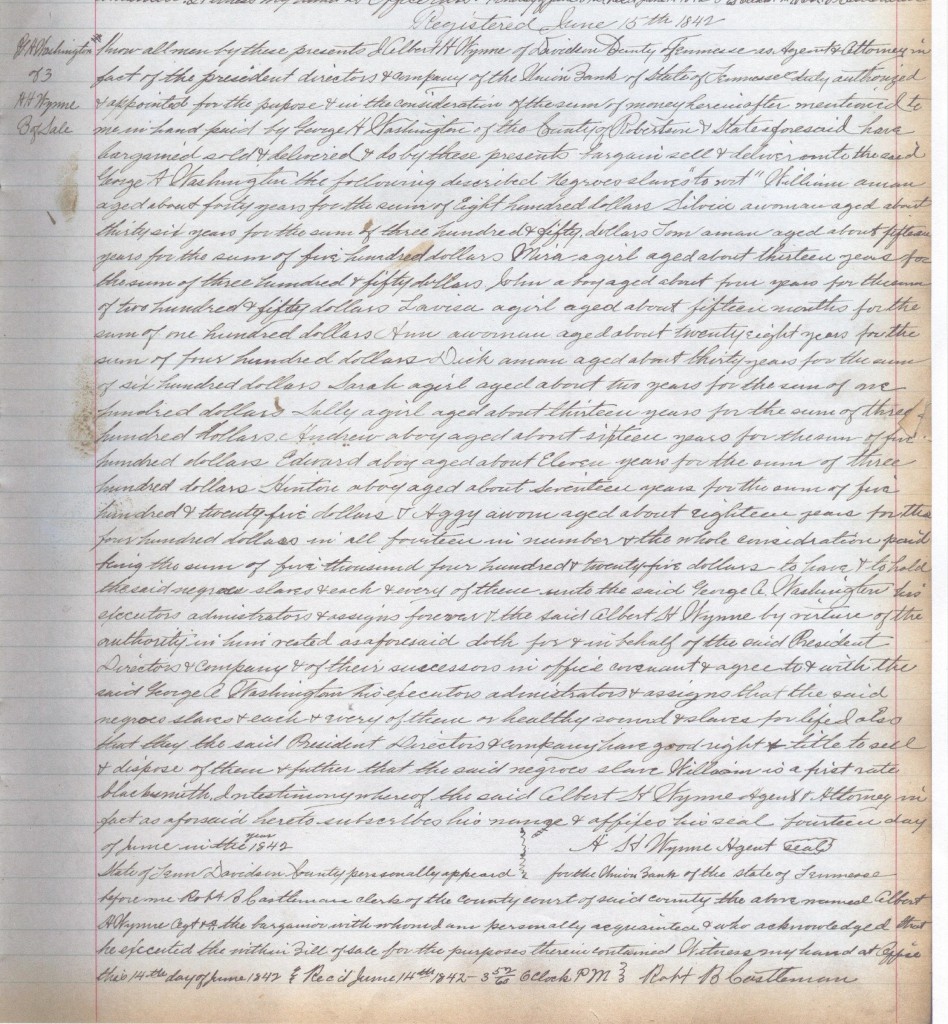Slave Bill of Sale from Union Bank of Tennessee to George A. Washington 1842
Among the thousands of documents in the Washington Family Papers housed in the Tennessee State Library and Archives are approximately 50 slave bills of sales. These sales involved 130 enslaved individuals purchased by Joseph Washington and his son George A. Washington from 1801 to 1843. The sales included several nuclear families: mothers and their small children; a family of five brothers; five men from the same plantation of unknown relationships; 29 slaves made up of 7 interrelated families; and one discussed here which includes fourteen slaves.
In June 1842, George A. Washington purchased 14 slaves from the Union Bank of Tennessee. Included in the transaction was William, described as a first-rate blacksmith. He was listed later on Wessyngton documents as Billy “the smith” and became Bill Smith after Emancipation. His wife Sylvia, their sons Tom and John and daughters Mira and Louisa were also listed.
Another family was Dick Scott, his wife Ann and their 2-year old daughter Sarah. Dick and Ann’s son, William Henry Scott, who was born at Wessyngton enlisted with the United States Colored Troops during the Civil War.
Also included in the purchase were Sally, Anderson, Edward, Henton and Aggy. It is not known if they were related; they could have been siblings. Aggy later married Dick Terry who was brought to Wessyngton Plantation 4 years earlier.
The descendants of those African Americans who were purchased in 1842 now number in the thousands.
Know all men by these presents that I Albert K. Wynne of Davidson County, Tennessee as agent and attorney in fact of the President, Directors & Company of the Union Bank of the State of Tennessee duly authorize and appointed for that purpose for and in consideration of the sums of money herein after mentioned to me in hand paid by George A. Washington of the county of Robertson & State aforesaid have bargained sold and delivered and do by these presents bargain sell and deliver unto the said George A. Washington the following described negro slaves to wit: William a man aged about forty years for the sum of eight hundred dollars; Sylvia a woman aged about thirty-six years for the sum of three hundred & fifty dollars; Tom a man aged about fifteen years for the sum of five hundred dollars; Mira a girl aged about thirteen years for the sum of three hundred & fifty dollars; John a boy aged about four years for the sum of two hundred dollars; Louisa a girl aged about fifteen months for the sum of one hundred dollars; Ann a woman aged about twenty-eight years for the sum of four hundred dollars; Dick a man aged about thirty years for the sum of six hundred dollars; Sarah a girl aged about two years for the sum of one hundred dollars; Sally a girl aged about thirteen years for the sum of three hundred dollars; Anderson a boy aged about sixteen years for the sum of five hundred dollars; Edward a boy aged about eleven years for the sum of three hundred dollars; Henton a boy aged about seventeen years for the sum of five hundred and twenty-five dollars; and Aggy a woman aged about eighteen years for the sum of four hundred dollars; being in all fourteen in number and the whole consideration paid being the sum of five thousand four hundred and twenty-five dollars. To have and to hold the said negro slaves and each and every of them unto the said George A. Washington his executors administrators and assigns forever. And the said Albert H. Wynne by virtue of the authority in him vested as aforesaid doth for and on behalf of the said President, Directors & Company and of their successors in office covenant and agree to and with the said George A. Washington his executors administrators and assigns that the said negro slaves and each and every of them are healthy, sound and slaves for life and also that they the said President, Directors & Company have good right and title to sell and dispose of them and further that the said negro slave William is a first-rate blacksmith.
In testimony whereof the said Albert H. Wynn, agent and attorney
Tags: Aggy Terry, Ann Scott, Dick Scott, George A. Washington, Interstate Slave Trade, Joseph Washington, Slave Bill of Sale, Slaves and Slaveholders of Wessyngton Plantation, Tennessee slavery, The Washingtons of Wessyngton Plantation, Union Bank of Tennessee, Wessyngton Plantation, William Henry Scott
